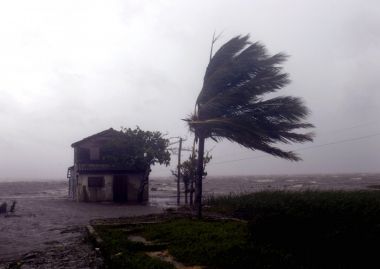Three surprising things God does in life's storms

A great gale arose, and the waves beat into the boat, so that the boat was already being swamped... (Mark 4v37)
What is life like for you when storms hit? I don't just mean bad weather, of course – though in many parts of the world that is a major problem.
I mean the bad stuff more generally which happens to us, often out of the blue: redundancy, bereavement, health problems. Then there's what someone once called "the multitude of petty annoyances" – more mundane things like a lost bank card, a frustrating call centre, or problems with our broadband.
The incident in which Jesus calms the storm is one which is well-known by many Christians. As we continue our journey through Mark's Gospel we find it at the end of chapter four.
And yet though widely-known I suspect it's also often misunderstood. There's a children's chorus that goes: "With Jesus in your boat you can smile at the storm" which I find rather trite. I don't think I'm going to be smiling at cancer or what is happening in Burundi anytime soon. Nor, based on the rest of Scripture, can we say that Jesus will automatically calm every storm that we encounter in life.
So what is going on? Here are some surprising things we learn when we read this incident closely:
1) Jesus sometimes leads us directly into storms
This whole episode starts when Jesus encourages his disciples to go across to the other side of the lake (v35). It's Jesus who initiates the whole sequence of events.
For any Christian who believes that Jesus promises a life free from difficulty this realisation can come as a shock. Yet Jesus tells us clearly that "in this world you will have trouble" (John 16:33). Sometimes that's due to the evil of others; sometimes we can't discern any cause; and sometimes Jesus seems to lead us into it deliberately. Whatever their origin, storms can be used by God to re-shape our character increasingly into the likeness of Christ. Check out what Paul (2 Corinthians 1:8-9) or Peter (1 Peter 1:6-9) have to say.
2) Jesus sometimes seems to be asleep in our storms
While the disciples were getting frantic about the storm, Jesus was asleep in the stern (v38). And that's often how it feels for us, isn't it? CS Lewis, writing about the death of his wife in A Grief Observed, said: "Where is God? This is one of the most disquieting symptoms."
Paul Miller, in his remarkable book A Praying Life – which was also written in the context of challenging circumstances – comments astutely: "When we suffer, we long for God to speak clearly, to tell us the end of the story, and, most of all, to show himself. But if he showed himself fully and immediately, if he answered all the questions, we'd never grow."
3) The disciples are still fearful after the storm – but in a different way
Of course, as we know, Jesus does calm this storm dramatically. The point of the incident, ultimately, is to show us Jesus' unique authority, as God incarnate, over nature.
And what do the disciples do? Do they get out their guitars and start singing happy choruses? No – they were "filled with great fear" and said to one another, "Who then is this, that even the wind and the sea obey him?" Fear of the storm has been replaced by a different kind of apprehension – an absolute awe of Jesus.
Jesus is not a comfortable travelling companion. He may lead us into storms to shock us and refine us; he may seem to be asleep. But, ultimately, Jesus is greater – shockingly greater – than any storm we face. And what he will achieve in us through those storms is most likely beyond our greatest imagining.
The Rough Guide to Discipleship is a fortnightly devotional series. David Baker is a former daily newspaper journalist now working as an Anglican minister in Sussex.











